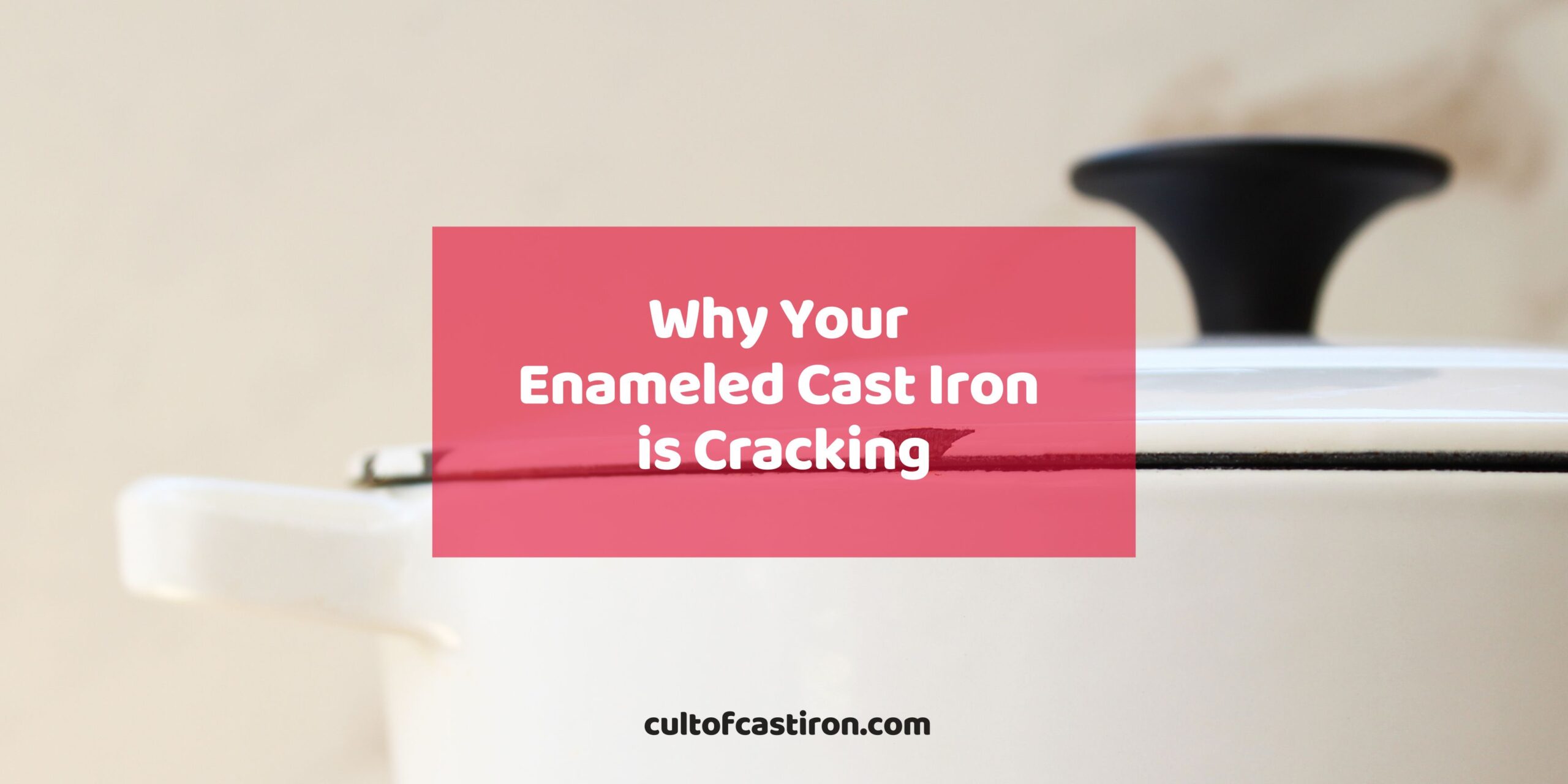Enameled cast iron cookware like Dutch ovens and braisers are not only great for cooking delicious meals but also for serving them in style. These colorful and versatile kitchenware can easily go from the stove or oven to the table, making them ideal for entertaining guests. However, to keep them looking beautiful and blemish-free, it’s important you take good care of these pieces.
Sure, enameled cast iron is durable and resistant to rust, but it can also crack or chip if handled poorly. In this article, we’ll discuss the common causes of enameled cast iron cracking, whether you can still use them, how to repair them, and most importantly, how to prevent them from cracking in the first place.
Common Causes of Cracked Enameled Cast Iron Cookware
Enameled cast iron cookware is made of cast iron coated with a layer of enamel, which is a type of glass. The enamel gives the cookware a smooth and nonstick surface, as well as a variety of striking colors. However, it’s also brittle and prone to cracking under certain conditions.
Here are some of the most common causes of enameled cast iron cracking:
Inducing Thermal Shock
Enameled cast iron cookware can withstand high temperatures, but not too high. The actual max temperature is not clear. Le Creuset suggests that their Dutch Ovens are rated up to 480°F (250°C). However, this rating only specifies the phenolic knob on top of the Dutch Oven’s lid, and not on the actual Dutch Oven itself.
With that said, what’s at play here is the difference in rates of thermal expansion between ceramics and cast iron. The enamel coating may crack as it expands at a slower rate than metals like cast iron.
This can happen when you place your Enameled Dutch Oven over a grill or an open fire, or pre-heat it on high over the stove.
A more surefire way to destroy your enameled cast iron cookware is by inducing thermal shock. It occurs when a sudden change in temperature causes the enamel to expand or contract rapidly. For example, if you place your hot enameled cookware in cold water or if you place your cold enameled cookware on a hot stove or oven, you may induce thermal shock.
Dropping on top of a hard surface
Enameled cast iron cookware is heavy and can break easily if dropped on a hard surface, such as a tile floor or a granite countertop. The impact can cause the enamel to crack or chip off.
Stacking cookware on top of each other
In case you didn’t know, tacking your enameled cast iron cookware on top of each other can cause scratches and chips on the enamel surface. The weight and friction of the cookware can damage the enamel over time.
Buying poor-quality enameled cookware
Not all enameled cast iron cookware are created equal. Some brands may use inferior materials or processes to make their cookware cheaper, but this can also compromise the quality and durability of the enamel. Poor-quality enameled cookware may crack or chip more easily than high-quality ones.
Using abrasive cleaners
Abrasive cleaners, such as steel wool or scouring pads, can scratch and damage the enamel surface of your cookware. These cleaners can also remove the glossy finish of the enamel, making it more susceptible to staining and cracking.
Scraping surface with metal utensils
Metal utensils, such as knives, forks, and spatulas, can also scratch and damage the enamel surface of your cookware. These can also create tiny cracks in the enamel that may grow larger over time.
Can You Still Use Cracked Enameled Cast Iron Cookware?
If your enameled cast iron cookware has cracked or chipped, you may wonder if you can still use it safely. The answer depends on where and how severe the crack or chip is.
- If the crack or chip is on the exterior of your cookware, such as on the bottom or the sides, then you can still use it without any problem. The exterior enamel does not affect your cookware’s cooking performance or safety.
- If the crack or chip is on the rim or the lid of your cookware, then you can still use it as long as it does not interfere with the seal or fit of the lid. The rim or lid enamel does not come into contact with food, so it poses no health risk.
- If the crack or chip is inside and near the cooking surface of your cookware, then you can still use it safely as long as it does not expose any bare cast iron. The exposed part is only cast iron, which is not toxic. However, you should know that enameled cast iron cracking may worsen when used and that bare cast iron may rust if not seasoned properly.
Can You Repair Cracked Enameled Cast Iron Cookware?
If your enameled cast iron cookware has cracked or chipped, you may wonder if you can repair it yourself. The short answer is no; you should not attempt to repair it yourself. Repairing enameled cast iron cookware requires special skills and equipment, such as a kiln and enamel powder, that are only readily available to some people. DIY repairs may also result in uneven or unsafe enamel that may crack or chip again.
The best option is to leave the repair to the professionals. If your cookware is still under warranty, you can ask the manufacturer for a replacement. Most reputable brands offer lifetime warranties on their enameled cast iron cookware and will replace your cookware if it has any defects or damages due to normal use.
If your cookware is not under warranty, or the damage is due to misuse or abuse, you can still try to find an independent repair shop specializing in enameled cast iron cracking. These shops can fix your cookware for a fee, depending on the extent and location of the damage. However, you should be aware that repaired cookware may not look or perform as well as new ones and that some repairs may not be possible at all.
How to Prevent Your Enameled Cast Iron from Cracking
The best way to avoid enameled cast iron cracking or chipping your enameled cast iron cookware is to prevent it from happening in the first place. Below are tips on how to take care of your enameled cast iron cookware and keep it in good condition for a long time:
Gently increase heat to avoid thermal shock
When heating your enameled cast iron cookware, start with low or medium heat and gradually increase it to the desired level. Don’t preheat your enameled cookware on high heat, or use it on a grill or over the campfire. Subsequently, avoid placing your hot cookware in cold water or vice versa.
Don’t place enameled cast iron inside the fridge
Storing your enameled cast iron cookware inside the fridge can increase the risk of thermal shock when you immediately try to cook with it while it is still fridge-cold. If you are using a cold enameled pan, let it “thaw” first to room temperature before cooking with it to avoid thermal shock.
Don’t cook enameled cast iron on an open fire.
Cooking your enameled cast iron cookware on an open fire, like a campfire or a grill, can expose it to extreme temperatures and uneven heat distribution that can crack or warp the enamel. Remember, enameled cast iron cookware is only designed for stovetop or oven use.
Don’t use abrasive materials for cleaning.
To clean your enameled cast iron cookware, use warm water, mild soap, and a soft sponge or cloth. Don’t use abrasive cleaners that can scratch and damage the enamel surface. If there are any stubborn stains or food residues, soak your cookware in warm water for a few minutes before scrubbing gently with a nylon brush or a wooden spatula.
Don’t stack cookware on top of each other
Stacking your enameled cast iron cookware on top of each other can cause scratches and chips on the enamel surface. To store your cookware properly, use a rack or shelf to hold each piece separately. You can also place a soft cloth or a paper towel between each piece to prevent them from rubbing against each other.
Don’t Crack Under Pressure: Keep Your Enameled Cast Iron Cookware from Cracking
Enameled cast iron cookware is a great addition to any kitchen, as it offers both functionality and beauty, but it also requires some care and attention to keep it from cracking or chipping. By following the tips above, you can enjoy your enameled cast iron cookware for many years to come!
If you want to learn more about using and maintaining your enameled cast iron cookware, you don’t have to look far! Here at the Cult of Cast Iron, we have created a space dedicated to all things cast iron, where you can find helpful tips, tricks, and advice on your favorite cookware. Whether you need a review, a guide, or a recommendation, we have it all!
Don’t miss this opportunity to become a master of enameled cast iron cookware. Scroll through our blog and become a part of the Cult of Cast Iron today!

Miguel is a cast iron enthusiast from Cavite, Philippines. He works in the digital marketing field as a content marketing strategist. On the side, he manages a small online bookstore and tends to his plants.

